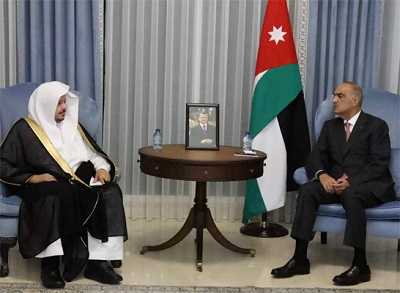Joint Parliament session reaches agreement on 5 disputed draft laws
The Jordan Times
AMMAN — Both chambers of Parliament on Sunday held a joint session where they reached an agreement and endorsed a number of disputed articles in five draft laws.
The session took place following successive disagreements between both Houses to accept draft laws on several matters. According to Article 92 of the Constitution: “Should either House twice reject any draft law and the other accept it, whether or not amended, both the Senate and the Chamber shall hold a joint meeting under the chairmanship of the president of the Senate to discuss the matters in dispute.”
The Parliament, as one entity, refused both Houses’ decisions to amend articles related to the residency fees, as part of the residency and foreigners’ affairs law, which means a return to the original law, the Jordan News Agency, Petra, reported.
The original law requires a JD30 payment for the issuance of a new residency permit, and JD10 for issuing a residency card in case of loss while the permit is still valid.
The Parliament, after a decision by the interior minister, endorsed an article added by the Lower House giving foreigners a residency permit if they were born to a Jordanian mother.
Regarding the state money law, both chambers agreed to impose an annual fine of 6 per cent on each unpaid financial claim, as an allowance to cover costs of administrative and money recollection follow-ups.
The agreed-upon article stipulates that such costs should not exceed 50 per cent of the original claim value, except for claims that also have fines under other laws.
Both Houses refused the 2016 amending draft law concerning the Public Security Department (PSD), after the Lower House rejected it, while the Senate insisted on a Tawjihi (General Secondary Education Certificate Examination) certificate or its equivalent as a requirement for promotion from warrant officer to second lieutenant.
The original law, which requires warrant officers to have a ninth grade certificate or equivalent to get promoted to second lieutenants, will stay in effect.
Both chambers omitted Article E of the 2010 temporary law of the passenger public transport law, added by the previous senate, which granted law enforcement authority to employees of the Land Transport Regulatory Commission, to enable them to impound any violating public transport vehicle.
The two chambers agreed on the 2015 public health law, as endorsed by the Upper Chamber, which proihibited smoking in diwans of associations and tribal councils, by classifying them as public places. It further granted the health minister the authority to consider any location as a public place.
Latest News
 King, Bahrain monarch stress need to maintain Arab coordination
King, Bahrain monarch stress need to maintain Arab coordination Security Council to vote Thursday on Palestinian state UN membership
Security Council to vote Thursday on Palestinian state UN membership Dubai reels from floods chaos after record rains
Dubai reels from floods chaos after record rains Khasawneh, Saudi Shura Council speaker discuss bilateral ties, regional developments
Khasawneh, Saudi Shura Council speaker discuss bilateral ties, regional developments Egyptian Foreign Minister condemns potential Palestinian displacement as 'war crime'
Egyptian Foreign Minister condemns potential Palestinian displacement as 'war crime'
Most Read Articles
- Senate president, British ambassador discuss strategic partnership, regional stability
- Jordan urges UN to recognise Palestine as state
- JAF carries out seven more airdrops of aid into Gaza
- Temperatures to near 40 degree mark next week in Jordan
- Safadi, Iranian counterpart discuss war on Gaza, regional escalation
- UN chief warns Mideast on brink of ‘full-scale regional conflict’
- US vetoes Security Council resolution on full Palestinian UN membership
- Google fires 28 employees for protesting $1.2 billion cloud deal with “Israeli” army
- Biden urges Congress to pass 'pivotal' Ukraine, Israel war aid
- Israeli Occupation strike inside Iran responds to Tehran's provocation, reports say